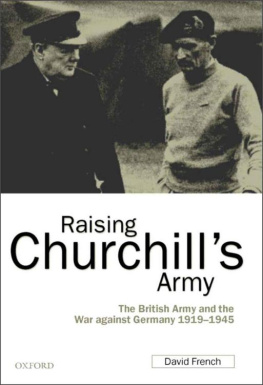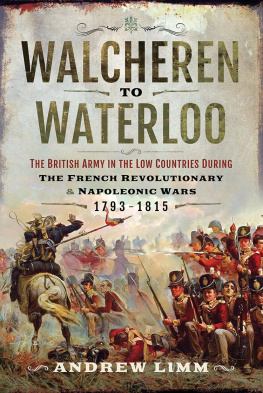Routledge Revivals
The British Way in Warfare, 1688 - 2000
First published in 1990, this title examines British defence policy from 1688 onwards; the year in which Britain was successfully invaded for the final time, and which marked a generation of warfare that lasted until 1714, during which Britain came to be known as a major European power. David French considers the strategic alliances that formed and changed throughout the period, and tests his hypotheses in light of the varying paradigms of war, and British wartime and peacetime practices. The ways in which the needs of both the army and the navy have been balanced over time are analysed, with particular attention paid to how parliament allotted money and resources to each. Wars under discussion include the American War of Independence, and the French Revolutionary and Napoleonic Wars. A detailed and critical title, this reissue will be of great value to history students studying Early Modern diplomacy, with a particular emphasis on the strategic development of British warfare and policy, and the place of Britain within the European power structure.
The British Way in Warfare
1688 - 2000
David French
First published in 1990
by Unwin Hyman Ltd
This edition first published in 2015 by Routledge
2 Park Square, Milton Park, Abingdon, Oxon, OX14 4RN
and by Routledge
711 Third Avenue, New York, NY 10017
Routledge is an imprint of the Taylor & Francis Group, an informa business
1990 David French
The right of David French to be identified as author of this work has been asserted by him in accordance with sections 77 and 78 of the Copyright, Designs and Patents Act 1988.
All rights reserved. No part of this book may be reprinted or reproduced or utilised in any form or by any electronic, mechanical, or other means, now known or hereafter invented, including photocopying and recording, or in any information storage or retrieval system, without permission in writing from the publishers.
Publishers Note
The publisher has gone to great lengths to ensure the quality of this reprint but points out that some imperfections in the original copies may be apparent.
Disclaimer
The publisher has made every effort to trace copyright holders and welcomes correspondence from those they have been unable to contact.
A Library of Congress record exists under LC control number: 90040132
ISBN 13: 978-1-138-81543-8 (hbk)
ISBN 13: 978-1-315-74665-4 (ebk)
THE BRITISH WAY IN WARFARE 16882000
David French
David French 1990
This book is copyright under the Berne Convention. No reproduction without permission. All rights reserved.
Published by the Academic Division of
Unwin Hyman Ltd
15/17 Broadwick Street, London W1V 1FP, UK
Unwin Hyman Inc.,
955 Massachusetts Avenue, Cambridge, Mass. 02139, USA
Allen & Unwin (Australia) Ltd,
8 Napier Street, North Sydney, NSW 2060, Australia
Allen & Unwin (New Zealand) Ltd in association with the Port Nicholson Press Ltd,
Compusales Building, 75 Ghuznee Street, Wellington 1, New Zealand
First published in 1990
British Library Cataloguing in Publication Data
French, David 1954
The British way in warfare, 16882000.
1. Great Britain. Defence. Policies of government, history
I. Title
355.033541
ISBN 0044457898
ISBN 004445791X pbk
Library of Congress Cataloging in Publication Data
Available from the Library of Congress
Typeset in 10/12 point Garamond
Printed in Great Britain by The University Press, Cambridge
Contents
Acknowledgements
This book could not have been written without the help and encouragement of many people. Paul Kennedy suggested the subject to me many years ago and has since provided much unobtrusive encouragement. Brian Bond, Michael Dockrill, Brian Holden Reid and the members of the military history seminar at the Institute of Historical Research, University of London, have provided help and intellectual stimulation over more than fifteen years. I am grateful to Jeremy Black, John Darwin, Martin Daunton, Michael Handel, Julian Hoppit, Barry Hunt, Bill Mihiel, Keith Neilson, Reinhard Rummel, Alan and Caroline Russell, the Library of Congress and the Library of University College, London, who all assisted me in numerous ways. I am especially grateful to the Woodrow Wilson International Centre, Washington, DC, for giving me a Fellowship in 1988/9 to complete this book. Charles Blitzer, Sam Wells Jr and Rob Litwak and their colleagues went out of their way to provide perfect working conditions. Parts of this book have been given as papers before audiences at the Woodrow Wilson International Centre, the National War College, Fort McNair, Washington and the Royal Military College of Canada, Kingston, Ontario. I am most grateful to the participants for their comments. I alone am responsible for any errors of fact or judgement.
This publication was prepared (in part) under a grant from the Woodrow Wilson International Centre for Scholars, Washington, DC. The statements and views expressed herein are those of the author and are not necessarily those of the Wilson Centre.
This book is dedicated to the memory of my mother, Lillian Esther French and to Stephen Thomas Russell in the hope that he will grow up never to know the reality of war.
David French
London/Washington DC
Introduction
In 1988 Sir John Nott, who had been Secretary of State for Defence from 1981 to 1983, compared the Ministry of Defence, and by implication current British defence policy, to a huge supertanker: well captained, well engineered, well crewed and with its systems being continuously updated, with no one ever asking where the hell its going. It might seem presumptuous that a historian should attempt to answer the question implied in Sir Johns criticism, where is British defence policy going and where ought it to go? It might seem paradoxical, or even irrelevant, that he should try to do so by writing a history of British defence policy beginning in 1688. My justification for attempting this task is my conviction that it is impossible to understand the choices facing todays defence policy-makers without some knowledge of the history of British defence policy over the last three hundred years.
It is necessary to explain the significance and meaning of the phrase defence policy. Over the last three centuries British defence policy had to meet three criteria if it was to succeed. It had to provide an adequate measure of physical security for the home islands and for British interests overseas. It had to achieve those objectives at an acceptable cost. Policies which placed a ruinously high social, economic, or financial cost on British resources would have been counter-productive. They would have consumed the human and economic assets they were supposed to protect. And thirdly, although the limits of what was socially, economically and financially acceptable expanded in wartime, there were some barriers beyond which no prudent government could go in either peace or war. It required decades to create effective armies and navies. Their development would have been hopelessly hindered if, every time the political complexion of the government changed, so did the prevailing notions of a viable defence policy. Defence policies had to be acceptable to the politically dominant groups in British society. The study of British defence policy therefore involves an examination of the way in which Britain marshalled its human, economic and political resources to protect its security interests.












